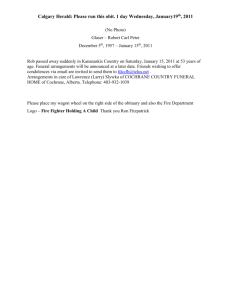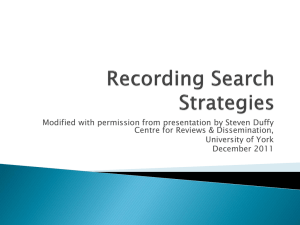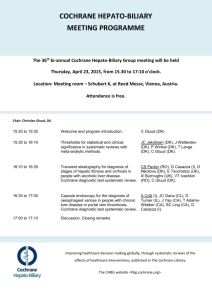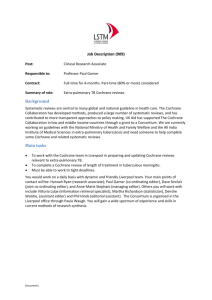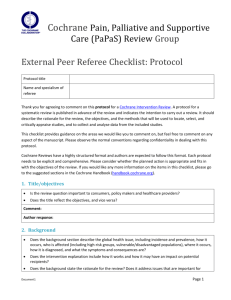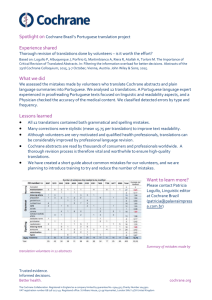Media Release
advertisement
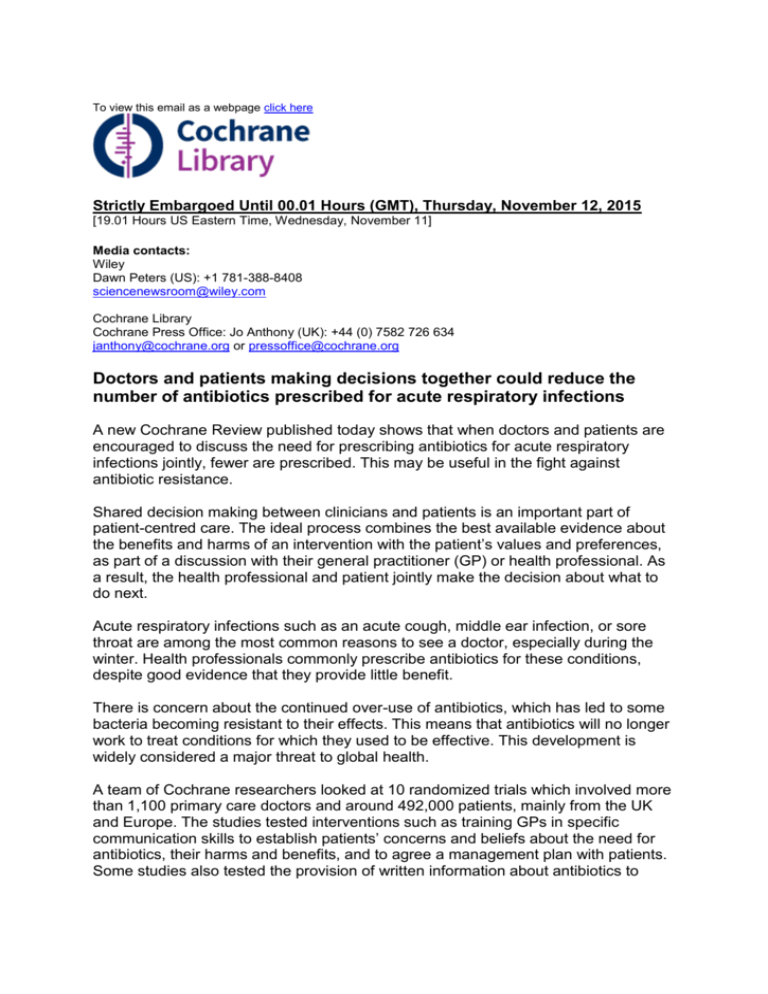
To view this email as a webpage click here Strictly Embargoed Until 00.01 Hours (GMT), Thursday, November 12, 2015 [19.01 Hours US Eastern Time, Wednesday, November 11] Media contacts: Wiley Dawn Peters (US): +1 781-388-8408 sciencenewsroom@wiley.com Cochrane Library Cochrane Press Office: Jo Anthony (UK): +44 (0) 7582 726 634 janthony@cochrane.org or pressoffice@cochrane.org Doctors and patients making decisions together could reduce the number of antibiotics prescribed for acute respiratory infections A new Cochrane Review published today shows that when doctors and patients are encouraged to discuss the need for prescribing antibiotics for acute respiratory infections jointly, fewer are prescribed. This may be useful in the fight against antibiotic resistance. Shared decision making between clinicians and patients is an important part of patient-centred care. The ideal process combines the best available evidence about the benefits and harms of an intervention with the patient’s values and preferences, as part of a discussion with their general practitioner (GP) or health professional. As a result, the health professional and patient jointly make the decision about what to do next. Acute respiratory infections such as an acute cough, middle ear infection, or sore throat are among the most common reasons to see a doctor, especially during the winter. Health professionals commonly prescribe antibiotics for these conditions, despite good evidence that they provide little benefit. There is concern about the continued over-use of antibiotics, which has led to some bacteria becoming resistant to their effects. This means that antibiotics will no longer work to treat conditions for which they used to be effective. This development is widely considered a major threat to global health. A team of Cochrane researchers looked at 10 randomized trials which involved more than 1,100 primary care doctors and around 492,000 patients, mainly from the UK and Europe. The studies tested interventions such as training GPs in specific communication skills to establish patients’ concerns and beliefs about the need for antibiotics, their harms and benefits, and to agree a management plan with patients. Some studies also tested the provision of written information about antibiotics to patients, and encouraging discussion with doctors about whether they are necessary. The review found that the numbers of antibiotic prescriptions for acute respiratory infections within six weeks of consultation were lower in groups that had received the training and information, compared with groups that had not. Based on the analysis of data from eight of the included trials, 47% of patients in the control groups were given a prescription, compared with 29% in the groups where the GPs or patients had received training or information. The researchers evaluated the quality of the evidence for the short-term effects as moderate; the long-term effects are uncertain, as few trials measured this. Professor of Clinical Epidemiology Tammy C Hoffmann, from the Centre for Research in Evidence-Based Practice, Bond University, Australia, says, “The evidence from this review shows that fewer antibiotics for acute respiratory infections could be prescribed if more patients and doctors made decisions jointly. It’s important that health professionals and patients are supported to have quality conversations about the use of antibiotics so that informed decisions can be made.” Co-author, Peter Coxeter, also from Bond University, says, “This could be one relatively simple way in which we reduce the effects of antibiotic resistance, but we need to find out if this type of training has a longer term effect on resistance.” Editor in Chief of the Cochrane Library David Tovey said, “This Cochrane Review addresses one of the most urgent global health challenges we face. Overuse of antibiotics has major consequences for individual patients and society more generally. Some clinicians believe that the pressure to prescribe antibiotics comes from the patients, but this review shows that shared decision making may reduce usage.” Access the full study on the Wiley Press Room here. (To access PDFs and embargoed stories you must be logged in to the Press Room before clicking the link. Request a login here.) Full citation: Coxeter P, Del Mar CB, McGregor L, Beller EM, Hoffmann TC. Interventions to facilitate shared decision making to address antibiotic use for acute respiratory infections in primary care. Cochrane Database of Systematic Reviews 2015, Issue 11. Art. No.: CD010907. DOI: 10.1002/14651858.CD010907.pub2. URL Upon publication: http://doi.wiley.com/10.1002/14651858.CD010907.pub2 For further information please contact: Jo Anthony, Senior Media and Communications Officer, Cochrane at M +44(0) 7582 726 634 or janthony@cochrane.org, pressoffice@cochrane.org. Tammy C Hoffmann, Professor of Clinical Epidemiology, Centre for Research in Evidence-Based Practice (CREBP) at Bond University, University Drive, Gold Coast, Queensland, 4229, Australia. E-mail: thoffmann@bond.edu.au or Terri Fellowes, Public Relations Manager, Bond University, Australia at Phone: +61 7 5595 1116, Mobile: +61 (0) 420 927 941 or E-mail: tfellowe@bond.edu.au. About Cochrane Cochrane is a global independent network of researchers, professionals, patients, carers and people interested in health. Cochrane produces reviews which study all of the best available evidence generated through research and make it easier to inform decisions about health. These are called systematic reviews. Cochrane is a not-for profit organisation with collaborators from more than 120 countries working together to produce credible, accessible health information that is free from commercial sponsorship and other conflicts of interest. Our work is recognised as representing an international gold standard for high quality, trusted information. Find out more at http://cochrane.org Follow us on twitter @cochranecollab If you are a journalist or member of the press and wish to receive news alerts before their online publication or if you wish to arrange an interview with an author, please contact the Cochrane press office: pressoffice@cochrane.org. About Wiley Wiley is a global provider of knowledge and knowledge-enabled services that improve outcomes in areas of research, professional practice and education. Through the Research segment, the Company provides digital and print scientific, technical, medical, and scholarly journals, reference works, books, database services, and advertising. The Professional Development segment provides digital and print books, online assessment and training services, and test prep and certification. In Education, Wiley provides education solutions including online program management services for higher education institutions and course management tools for instructors and students, as well as print and digital content. The Company's website can be accessed at www.wiley.com. If you would like to request complimentary media access to the contents of The Cochrane Library, please email sciencenewsroom@wiley.com.
